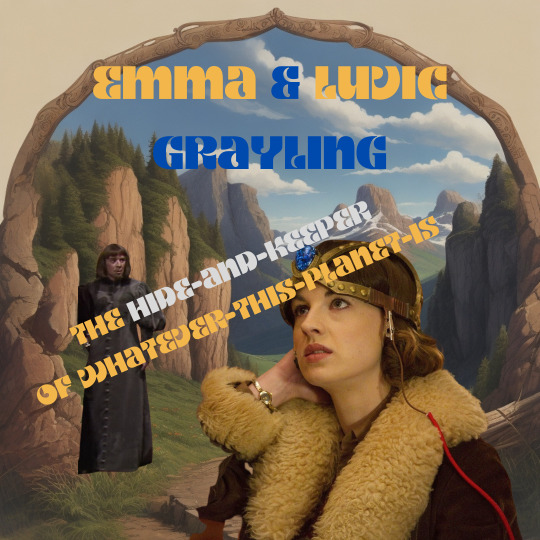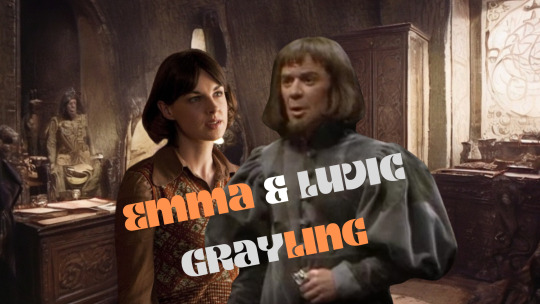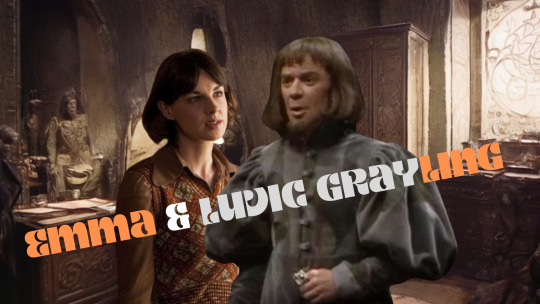#robin soans edit
Explore tagged Tumblr posts
Text
Luvic in a shellnut
I got a bit obsessed although I know it's not actually luvic it's robin playing him hope that helps
#doctor who#classic who#my art#my videos#my edits#doctor who edits#classic who edits#the keeper of traken#the keeper of traken edits#season 18 edits#new beginnings trilogy#new beginnings edit#canva#capcut#in a shellnut#luvic of traken#robin soans#luvic of traken edit#robin soans edit
2 notes
·
View notes
Text

Their first album!
Of course that's the title XD
#doctor who#classic who#nuwho#luvic of traken#emma grayling#robin soans#jessica raine#leonardo.ai#canva#robin soans edit#jessica raine edit#lumma
9 notes
·
View notes
Text


Emma and Luvic Grayling, because I'm starting to ship them apparently.
It came because of AI generation!
#doctor who#classic who#nuwho#emma grayling#luvic of traken#luvic grayling#YES HES LUVIC GRAYLING NOW SCREW THE RULES#canva#leonardo.ai#doctorwhoedit#classicwhoedit#nuwhoedit#jessica raine#jess raine#robin soans#jessica raine edit#jess raine edit#robin soans edit#nuwho edit#new who edit#classic who edit#doctor who edit
6 notes
·
View notes
Text
Architecture Drawing Prize 2021
World Architecture Festival Architecture Drawing Prize 2020, WAF Award News, Designs
World Architecture Festival Architecture Drawing Prize 2021
30 June 2021
Entries for The Architecture Drawing Prize 2021 are now open!
In partnership with Make Architects and Sir John Soane’s Museum, the World Architecture Festival (WAF) has announced the call for entries for the fifth edition of The Architecture Drawing Prize, sponsored by Gleeds. Launched in 2017, the Prize was established to celebrate and showcase the art and skill of architectural drawing.
In the spirit of work by great architects of the past, from Palladio and John Soane to Le Corbusier and Cedric Price, The Architecture Drawing Prize is a platform for reflecting on and exploring how drawing continues to advance the art of architecture today.
It embraces the creative use of digital tools and digitally produced renderings, while recognising the enduring importance of hand drawing.
The organisers invite entries of all types and forms – from conceptual to technical or construction drawings, cutaways or perspective views and anything in between.
‘ReReading Metropolis’ by Chenglin Able – Winner in the 2020 Digital category: drawing : Chenglin Able
‘Dear Hashima’ by Marc Brousse – Winner in the 2020 Hand-drawn category: drawing : Marc Brousse
‘Apartment #5, a Labyrinth and Repository of Spatial’ by Clement Laurencio – Winner in the 2020 Hybrid and Overall category: drawing : Clement Laurencio
‘Airplane Tower’ by Victor Hugo and Cheryl Lu Xu – Winner in the 2020 Lockdown Prize category: drawing : Victor Hugo and Cheryl Lu Xu
The Architecture Drawing Prize 2021
Categories
Entries are welcomed from architects, designers and especially students from around the world in the following categories: Hand drawn, Digital, and Hybrid (combining the two). Submissions across the three categories will be evaluated on the basis of their technical skill, originality of approach and ability to convey an architectural idea. Drawings can be entirely speculative or relate to real projects.
Lockdown Prize
For the second year running, there will also be a special prize focused on the global lockdown during the Covid-19 pandemic, chosen from all the entries. The Lockdown Prize will be focused on a drawing completed during lockdown or a drawing relating to the changes that Covid-19 will bring to architecture.
Judges
This year’s judges are
artists Ben Langlands & Nikki Bell; Ken Shuttleworth, founder of Make Architects; Lily Jencks, founder of LilyJencksStudio and JencksSquared; Louise Stewart, curator at Sir John Soane’s Museum; Narinder Sagoo, senior partner at Foster + Partners; artist Pablo Bronstein; Robin Brodie Cooper, Equity Partner at Gleeds, and Paul Finch, programme director of the World Architecture Festival.
Paul Finch commented: ‘The universal language of drawing has a special significance in current circumstances and we look forward to celebrating excellence once again.’
Winner of the Lockdown Prize 2020, ‘Airplane Tower’ by Victor Hugo and Cheryl Lu Xu
The entry deadline for submissions is 17 September 2021. The winners and shortlist will be decided in October, and displayed at World Architecture Festival in Lisbon from 1 to 3 December. Winners will receive complimentary tickets to the event, which will include a panel discussion featuring some of the award judges. A selection of winning and other entries will be the subject of an exhibition at the Soane Museum in early 2022.
More than 80 percent of the shortlisted entries for 2020 were submitted by entrants who are students or under the age of 30. This year, the organisers will hold the 2020 entry prices with a standard submission costing £198 and a reduced rate of £24 for all entries by students and under-30s. There is also a multiple entry discount offered when submitting three or more projects. Entrants should use the code STANDARDMULTI10 or STUDENTMULTI10 at the checkout to save 10%.
‘Polymorphous Spatical Monosodium Glutamate’ by Matthew Poon – Shortlisted in the 2020 Hand-drawn category: drawing : Matthew Poon
‘Construction as Heritage’ by Joshua Bristow – Shortlisted in the 2020 Hand-drawn category – A Case for Discrete Industry: drawing : Joshua Bristow
Louise Stewart, curator at Sir John Soane’s Museum, adds: “Sir John Soane’s Museum is delighted to host the fifth annual exhibition of works from The Architecture Drawing Prize. The Prize highlights the ways in which drawing remains central to architectural practice and is a key driver in the creative process. With its range of digital, hand- drawn and hybrid works, the exhibition will offer a powerful insight to the discipline of architectural drawing today.”
Ken Shuttleworth founder of Make Architects, comments: “We’re genuinely excited to see The Architecture Drawing Prize start its fifth year. I’m so pleased that the Prize has provided a level of meaning and connection during the lockdowns for those involved and I’m especially delighted at its continuing role in providing a platform and profile to many hugely talented young artists and architects.”
‘Choate Colony Hall’ by Jeff Stikeman – Shortlisted in the 2020 Hybrid and Overall category: drawing : Jeff Stikeman
‘Mechanical Theatre of Smash Palace’ by Jono Yoo – Shortlisted in the 2020 Hybrid and Overall category: drawing : Jono Yoo
Robin Brodie Cooper, an Equity Partner at Gleeds, the 2021 sponsor of the prize, commented: “When Ken Shuttleworth, founder of Make Architects asked us to be one of the lead sponsors for the Architectural Drawing Prize Gleeds saw this as an opportunity to give something back to the young and dynamic generation in the Architectural community that create the most imaginative drawings which will eventually lead to the great designs of buildings in the future.”
For full details on how to enter the Architecture Drawing Prize visit: https://thedrawingprize.worldarchitecturefestival.com Instagram @architecturedrawingprize
World Architecture Festival 2021 Architecture Drawing Prize image / information received 300621
Previously on e-architect:
WAF 2020 Architecture Drawing Prize
World Architecture Festival call for entries to The 2020 Architecture Drawing Prize
Jerome Xin Hao Ng, ‘Metabolist of a Dementia Nation’, the winner of the Hybrid category 2019
World Architecture Festival 2020 Drawing Prize
Anton Markus Pasing, City in a box: paradox memories, overall winner of the 2019 Architecture Drawing Prize
WAF 2019 Architecture Drawing Prize
World Architecture Festival 2019 call for entries to The 2019 Architecture Drawing Prize
Li Han, ‘The Samsara of Building No. 42 on Dirty Street’, overall winner of the 2018 Architecture Drawing Prize: image : Li Han, courtesy of WAF World Architecture Festival 2019 Drawing Prize
Comments / photos for the World Architecture Festival 2021 Architecture Drawing Prize page welcome
The post Architecture Drawing Prize 2021 appeared first on e-architect.
0 notes
Text
University Research - Solar Task 2
Royal Central School of Speech and Drama
What are the entry requirements?
The entry requirements to apply for this course are at minimum requirements being 2 A Levels at a C, 3 GCSEs at a C and a selection by audition.
How long will the training be?
The training will take place over a 3 year spread.
How much will it cost?
The courses vary in price but there will be an audition fee of £55.
What will you do?
Year 1; Classes and workshops in acting fundamentals, spoken/sung voice (including 1:1 weekly singing lessons), acting through song, actor movement, ballet, jazz, contemporary dance, clowning, text analysis (classical and modern), musical theatre repertoire, ensemble singing/aural training. Students undertake performance projects that include Chekhov/ Dostoyevsky/ Pinter scenes and Shakespeare comedy.
Year 2; Continuing practical training in all disciplines. Performance projects include Greek theatre (incorporating modern text), Brecht, contemporary American theatre, contemporary British scene study, comedy of manners, Shakespeare tragedy and a Sondheim musical. Students perform in the public production book musical alongside final year students.
Year 3; Focus is on professional development with public performances (plays, musicals, actor/musician shows), a West End industry showcase, acting for camera (including a professional showreel), radio training/microphone and audition technique workshops. Students perform in a wide variety of theatrical repertoires.
What will you get at the end?
At the end of the 3 year course you will have a Bachelor of Arts (Hons) in Acting.
What monologues will you need to prepare?
The monologues that you need to prepare will be sent to you through an email once you’ve applied to the university.
Do you think your monologues are suitable for this audition?
I’m not really sure because you have to wait for the email to start looking at monologues to prepare, so it all depends what type of monologue they’d prefer you to do for the audition.
Birmingham School of Acting
What are the entry requirements?
Admission is by audition; in addition, we require 160 points from A-levels or equivalent. Individual offers are made regarding grades in order to secure a place on the course.
How long will the training be?
The training will be over 3 years; each year you focus on a different element of acting.
How much will it cost?
There’s an audition fee of no more than £46, but the whole course costs around £9000 per year for 3 years.
What will you do?
Year 1; the first year of study will focus on the development of skill, and you will be assessed through acting, voice, movement and singing. Within the Acting, Voice, Physical Skills and Singing modules you will learn the basic skills and knowledge expected of a contemporary actor. Your first year is very much a technical year. These seemingly separate skills are in truth all linked together, and ultimately will facilitate a seamless integration into acting.
In the Project module you will work towards a presentation of work to an audience of your tutors and peers. You will also learn to research and explore theatre history and context, developing your critical and analytical skills in the module Acting Theory module, alongside Stanislvaksi system of text analysis.
Year 2; The delivery of your second year will be split evenly between technical and performance modules. The work you produce within your second year will build upon and develop the skills you have accumulated in your first year of study.
Much like your first year you will be taught through a series of modules. The modules Acting Two, Voice Two, Physical Skills Two and Singing Two will bring together your practical skills. You will creatively explore the skills you have learnt in your first year. Pushing back boundaries and making new discoveries you will begin to see the bigger picture of the acting industry. You will also continue to develop your abilities to explore, investigate and research through an individual research project.
Your work will be shown to a public audience in the Workshop module. Along with exploring acting for the stage, you will also learn important techniques for radio and screen in the Acting Two module. In your second year of study your technical skills will be deepened and developed, and the beginnings of integration between them are expected.
Year 3; your final year of study will predominantly be performance based. Your training will come together in live, public performances in the Production module. In addition to this you will perform for screen and radio in the Recorded Media module.
You will learn the art of preparing audition material and the various formats of the contemporary audition. You will perform to an invited audience of industry professionals in Birmingham and London as part of the Professional Studies Module. This module will provide you with the help, advice and professional know-how to start a career, enabling you to set out into your first job with confidence and success.
During your final year of training you will partake in three professional productions out of a season of 10, which take place in external theatres.
What will you get at the end?
At the end of the 3 years you will have a Bachelor of Arts (Hons) in Acting.
What monologues will you need to prepare?
You will be asked to present two speeches to a panel of staff and/or professional actors – normally two people, but on occasion more. You will have up to ten minutes with the panel who will provide verbal feedback on what you present, discuss your choice of speeches and possibly your motives for attending drama school. You must prepare and memorise two contrasting speeches from different plays, one of which must have been written in the last 20 years and one of which must be from an Elizabethan / Jacobean play. A suggested list of Elizabethan / Jacobean pieces can be found in the guidance pack for your particular gender which is on the official website for this course.
Each selection should be no more than two minutes in length and suitable for your gender, age and experience (you may be stopped if a speech exceeds two minutes in length).
All speeches should be from published plays. Excerpts from film script, television dramas and unpublished plays are not acceptable unless you can provide at audition, and leave with us, a copy of the actual and complete script with the speech used clearly marked.
What monologues will you need to prepare for the audition?
There’s a list on the website for the audition, so looking at that and then deciding if you want to complete a monologue from that list or a similar one to them.
Do you think your monologues are suitable for this audition?
Personally looking at the list on their website I’d say that my monologue wasn’t particularly suitable for this audition because it needs to be suitable for your gender, age and experience and my character doesn’t really relate to myself personally.
London Academy of Music and Dramatic Arts (LAMDA).
What are the entry requirements?
There are no academic pre-requisites for any of our courses.
How long will the training be?
The training will last 3 years.
How much will it cost?
For UK / EU students: £9,000 per year, Applicants for our BA (Hons) Professional Acting, FdA Professional Acting, MA Classical Acting for the Professional Theatre, MA Directing, Postgraduate Diplomas and Foundation Diploma should include: £49 by credit or debit card or £63 by cheque (online application) / £63 by cheque (paper application) for an audition in the UK.
What will you do?
Year 1; Students undertake technical classes in acting, improvisation, voice, movement, singing, textual analysis and interpretation, Alexander Technique, physical theatre, stage combat and dance. They are also introduced to screen acting. Technical classes represent 80% of the course content; the rest is dedicated to scene study work on comedy, Jacobean, Greek and contemporary drama. Students present four workshop performances, which are closed to the public to encourage exploration and experimentation.
Year 2; Classwork represents 60% of the course content and includes intensive audio and screen acting modules. In addition, students rehearse and present workshop performances of Shakespeare, Restoration drama, 19th century Russian naturalism and musical theatre. These performances are closed to the public. Second year projects include our Make Your Own Film module and the LAMDA Long Project – in which students collaborate with a professional writer and director to produce the first draft of a new play. This may become a public LAMDA production in their final year. Robin Soans’ Mixed Up North – originally developed as a LAMDA Long Project – went on to tour the UK as an Out of Joint and Octagon Theatre Bolton production.
Year 3; Students perform public productions in LAMDA’s state-of-the-art theatres – some of these productions tour to venues across the UK and abroad. Students complete the final phase of their screen acting, voice-over and microphone training. They create a professionally directed and edited short film, record a radio play, complete a professional voice reel and continue to develop their on-camera audition technique. Technical classes support our students throughout their final year.
What will you get at the end?
At the end of the 3 year course you’ll get a Bachelor of Arts (Hons) in Professional Acting.
What monologues will you need to prepare for this audition?
You should present:
- one monologue from an Elizabethan or Jacobean play; and
- one monologue from a play written in either the 20th or 21st Century, but not a piece written by you or by an unknown or little-known author.
(Each piece should last no longer than three minutes and there must be a clear contrast between the two).
After presenting your work to the panel, you will be interviewed briefly as part of the audition process.
Do you think your monologues are suitable for this audition?
Personally I feel that my contemporary monologue would be suitable to an extent because, it’s got to be known to the panel so on that particular note it wouldn’t be but the actual monologue as a whole would probably be suitable but my Shakespeare monologue wouldn’t because it’s not my particular age range or gender.
1 note
·
View note
Text
Here are the songs in it:


Their first album!
Of course that's the title XD
#album#doctor who#classic who#nuwho#luvic of traken#emma grayling#robin soans#jessica raine#leonardo.ai#canva#robin soans edit#jessica raine edit#lumma#album cover
9 notes
·
View notes